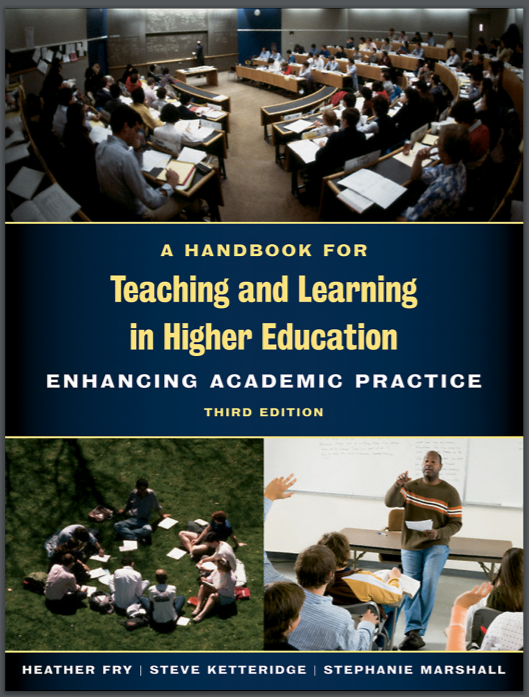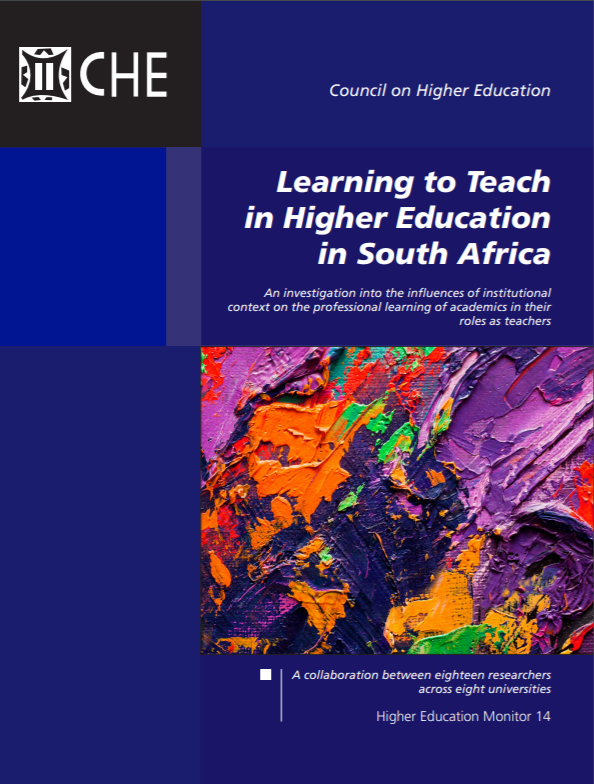A Handbook for Teaching and Learning in Higher Education Enhancing academic and Practice
 A Handbook for Teaching and Learning in Higher Education is sensitive to the competing demands of teaching, research and scholarship, and academic management. Against these contexts, the book focuses on developing professional academic skills for teaching. Dealing with the rapid expansion of the use of technology in higher education and widening student diversity, this fully updated and expanded edition includes new material on, for example, e-learning, lecturing to large groups, formative and summative assessment, and supervising research students. Part 1 examines teaching and supervising in higher education, focusing on a range of approaches and contexts. Part 2 examines teaching in discipline-specific areas and includes new chapters on engineering, economics, law, and the creative and performing arts. Part 3 considers approaches to demonstrating and enhancing practice. Written to support the excellence in teaching required to bring about learning of the highest quality, this will be essential reading for all new lecturers, particularly anyone taking an accredited course in teaching and learning in higher education, as well as all those experienced lecturers who wish to improve their teaching. Those working in adult learning and education development will also find it a particularly useful resource.
A Handbook for Teaching and Learning in Higher Education is sensitive to the competing demands of teaching, research and scholarship, and academic management. Against these contexts, the book focuses on developing professional academic skills for teaching. Dealing with the rapid expansion of the use of technology in higher education and widening student diversity, this fully updated and expanded edition includes new material on, for example, e-learning, lecturing to large groups, formative and summative assessment, and supervising research students. Part 1 examines teaching and supervising in higher education, focusing on a range of approaches and contexts. Part 2 examines teaching in discipline-specific areas and includes new chapters on engineering, economics, law, and the creative and performing arts. Part 3 considers approaches to demonstrating and enhancing practice. Written to support the excellence in teaching required to bring about learning of the highest quality, this will be essential reading for all new lecturers, particularly anyone taking an accredited course in teaching and learning in higher education, as well as all those experienced lecturers who wish to improve their teaching. Those working in adult learning and education development will also find it a particularly useful resource.
Learning to Teach in Higher Education South Africa

An investigation into the influences of institutional context on the professional learning of academics in their roles as teachers.
A collaboration between eighteen researchers across eight universities.
The full report is available on the CHE website
here.
PREFACE
"Teaching and learning are never neutral. Every aspect is ideological in nature: from the admission of students, to the selection of curriculum content, to the adoption of learning materials, to the pedagogical approach, to the mode of assessment and the quality of the feedback. The form of disciplinary knowledge may vary from the more subjective and contentious to the more objective and broadly accepted, but teaching and learning remain highly political acts across all institutions, faculties and disciplines. So it is unsurprising that when a country undergoes major social change, ideological demands are placed on teaching and learning." (HE Reviewed, CHE 2016 p.143)
There are many and diverse influences on teaching and learning as a political act, from broad social movements that challenge what is taught, to the ways in which resources have historically been allocated, to the values and goals of different disciplines, and the more immediate institutional and faculty contexts in which they take place. Learning to teach in higher education in South Africa is a timely and well-researched contribution to understanding the influences of that more immediate layer, that is, of institutional contexts, on the professional learning of academics in their roles as teachers. It explores questions of whether it matters to the professional learning process whether one is teaching in a context in which resources are scarce, or whether the departmental leadership style is authoritarian, or whether an institution has a strong drive to increase research output. And if it matters, what are the implications for facilitating opportunities for academics to 'learn to teach' in higher education?
Undertaken by a team of academic staff developers across eight institutional contexts, this research report offers a comprehensive, nuanced and theorised set of insights into the role that context plays in the ways in which academics learn to teach. Such insights can inform the development of professional learning initiatives at both the institutional and national policy levels. The report is one of the outcomes of a large-scale study carried out between 2011 and 2016, made possible by funding from the National Research Foundation. It has spawned many research articles, books and PhD studies and has thus in itself provided a vehicle for the development of further research and researchers on the subject. The team chose to work collaboratively, with all the possibilities and difficulties that that entails, as reflected on in Chapter 7. Thereby, it also offers an illuminating reflection and insights into such research methodology.
While the report does not specifically set out to offer anything new or surprising about the cultural and contextual differences between institutions, it does offer a coherent interpretation of such complex and intersecting conditions examined through a single theoretical lens. Indeed, the concepts of 'structure, culture and agency' as developed in the work of the social realist, Margaret Archer, formed the theoretical canvas for the study. The theory allows for the analytical separation of different domains for the purposes of understanding the interplay of relations, but it also offers a hope of bringing about social transformation through exercising particular modes of reflexivity. As the report argues, quoting Archer, transforming our positions in society is possible, but "their transformation depends partly on the subjective reflexivity of primary agents in seeking to play an active part in reshaping society's resource distribution". The researchers may not always have found it easy to apply a single theoretical lens, but the theory-based study provides a coherent representation of the differences and similarities between the institutional contexts of the eight universities, throwing into relief their different influences on professional learning, and points to pathways towards the improvement of teaching and learning in South African higher education.
A major contribution of this report that is likely to influence the discourse on teaching and learning significantly, is the conceptual shift from 'professional development' to 'professional learning'. As an external reviewer noted, "in the context of the decolonization debate, [this shift] has the potential to offer a more flexible continuum in which to position different learning opportunities". It also recognises the importance of group and individual agency and the importance of informal contexts in learning to teach.
The publication of this research report takes forward the CHE's ongoing endeavours to improve and enhance the quality of teaching and learning in higher education. It serves to complement the more practical implementation of quality assurance in higher education, which for the CHE has largely entailed a focus on teaching and learning, whether in accreditation, audits or the Quality Enhancement Project (QEP) that began in 2014 in which one of the four focus areas that universities were asked to engage with was "enhancing academics as teachers". Participation in the QEP over the past three years has contributed to a heightened awareness across the sector of the importance of academics developing competence in university teaching, particularly given the increased emphasis being placed on student success by both the government and higher education institutions themselves. As a result, universities
are becoming more intentional in their efforts to help academics develop this competence. The release of the study is therefore timely, as not only will it add to our collective understanding of the complexities and nuances in the interrelationships between structure, culture and agency that inform and influence academics in their roles as teachers, but it will serve as a useful resource for institutions in their efforts to enhance university teachers and teaching.
The Higher Education Monitor series, as was elaborated in the first issue in 2003, "aims to stimulate research and the production of knowledge and interpretive frameworks that could contribute to better theorisation of higher education, more rigorous analysis of higher education complexities and more effective strategies for change and progress". It is our hope that this report will do exactly that.
We thank the National Research Foundation for funding the project that made the study and the ensuing report possible, Professor Brenda Leibowitz for leading the team of researchers, our external reviewers, and the individual authors who took the time to present drafts of their chapters to Dr Webbstock of the CHE at a workshop in May 2016.
Professor Narend Baijnath
CEO

